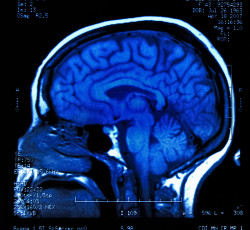Top Class Actions’s website and social media posts use affiliate links. If you make a purchase using such links, we may receive a commission, but it will not result in any additional charges to you. Please review our Affiliate Link Disclosure for more information.

Scientific medical evidence shows a correlation between long term Dilantin use and a rare brain condition known as cerebellar atrophy.
What is Dilantin?
Phenytoin, sold under the brand name Dilantin among others, is an anti seizure medication. It is useful for the prevention of tonic-clonic seizures and partial epilepsm.
Dilantin may accumulate in the cerebral cortex over long periods of time which can cause atrophy of the cerebellum. The degree of cerebellar atrophy is related to the duration of Dilantin treatment and is not related to dosage of the anti-seizure medication.
What is Cerebellar Atrophy?
Cerebellar atrophy is a degeneration of the cerebellum, a section of the brain responsible for balance, voluntary muscle movements, and posture. People with damage to the cerebellum can experience symptoms like unsteady gait, poor muscle control, and trouble speaking or swallowing.
Other symptoms of cerebellar atrophy include:
- Impaired coordination in the trunk or arms and legs
- Frequent stumbling
- Unsteady gait
- Uncontrolled or repetitive eye movements
- Trouble eating and performing other fine-motor tasks
- Slurred speech
- Vocal changes in tone, volume, and pitch
- Headaches
- Behavioral or personality changes
- Dizziness
Signs of cerebellar atrophy may onset slowly or rapidly, depending on why the patient’s cerebellum is degenerating.
Causes of Cerebellar Atrophy
The cerebellum is the area of the brain responsible for controlling muscle coordination. If it becomes inflamed or damaged, a person may suddenly lose coordination. Damage, degeneration or loss of nerve cells in the part of the brain that controls muscle coordination (cerebellum), results in cerebellar ataxia (unsteadiness).
The cerebellum comprises two ping pong-ball-sized portions of folded tissue situated at the base of the brain near the brainstem. The right side of the cerebellum controls coordination on the right side of the body; the left side of the cerebellum controls coordination on the left.
Diseases that damage the spinal cord and peripheral nerves that connect your cerebellum to the muscles also may cause ataxia. Common causes of cerebellar atrophy/ataxia include:
- Head trauma
- Stroke
- Cerebral palsy
- Multiple sclerosis
- Chickenpox
- Tumor
Additionally, cerebellar atrophy can be triggered by a rare toxic reaction to a specific mediation such as Dilantin.
Study Links Dilantin to Cerebellar Atrophy
One study conducted in 1994 found that cerebellar atrophy may be linked to patients with epilepsy who have been exposed to the anti-seizure medication Dilantin long term. The study consisted of dozens of patients with partial epilepsy who had been taking phenytoin for an extended period of time.
Using magnetic imaging resonance imaging scans, the researchers examined the extent of cerebellar atrophy, finding that patients who were exposed to Dilantin long-term had more pronounced focal cerebral atrophy than patients in the control group.
The researchers cautioned that there was no correlation between the severity of seizures and the length of phenytoin exposure.
If you or a loved one suffered a type of focal cerebral atrophy known as cerebellar atrophy or ataxia after taking Dilantin or the generic form phenytoin, you may be eligible to join a FREE phenytoin lawsuit/Dilantin lawsuit investigation and pursue compensation for your injuries.
In general, phenytoin lawsuits are filed individually by each plaintiff and are not class actions.
Do YOU have a legal claim? Fill out the form on this page now for a free, immediate, and confidential case evaluation. The attorneys who work with Top Class Actions will contact you if you qualify to let you know if an individual Dilantin lawsuit or cerebral atrophy class action lawsuit is best for you. Hurry — statutes of limitations may apply.
ATTORNEY ADVERTISING
Top Class Actions is a Proud Member of the American Bar Association
LEGAL INFORMATION IS NOT LEGAL ADVICE
Top Class Actions Legal Statement
©2008 – 2024 Top Class Actions® LLC
Various Trademarks held by their respective owners
This website is not intended for viewing or usage by European Union citizens.
Get Help – It’s Free
Join a Free Dilantin, Phenytoin Cerebral Atrophy Class Action Lawsuit Investigation
If you or a loved one were injured by Dilantin/phenytoin side effects, you may have a legal claim. See if you qualify to pursue compensation and join a free phenytoin cerebral atrophy class action lawsuit investigation by submitting your information for a free case evaluation.
An attorney will contact you if you qualify to discuss the details of your potential case.
Oops! We could not locate your form.












